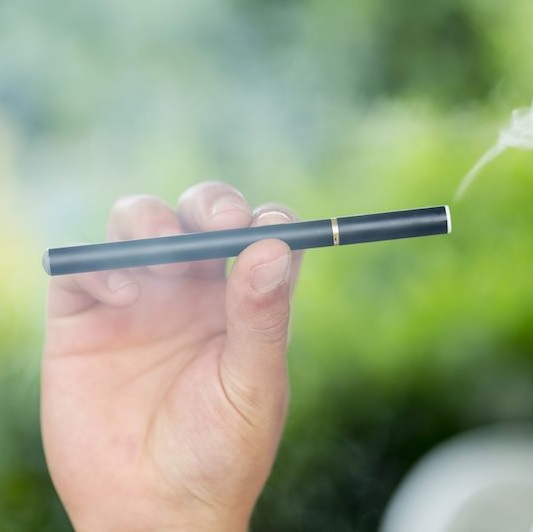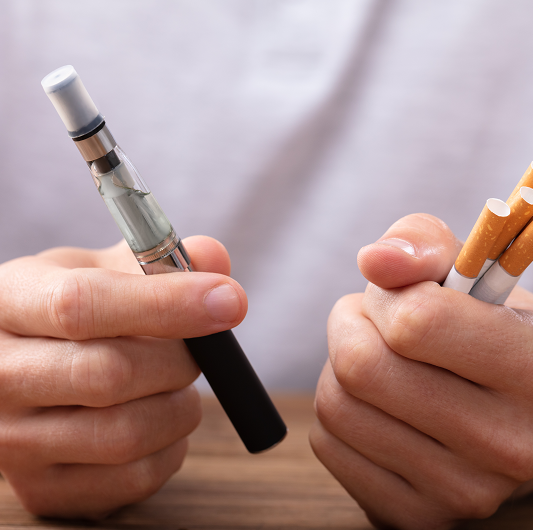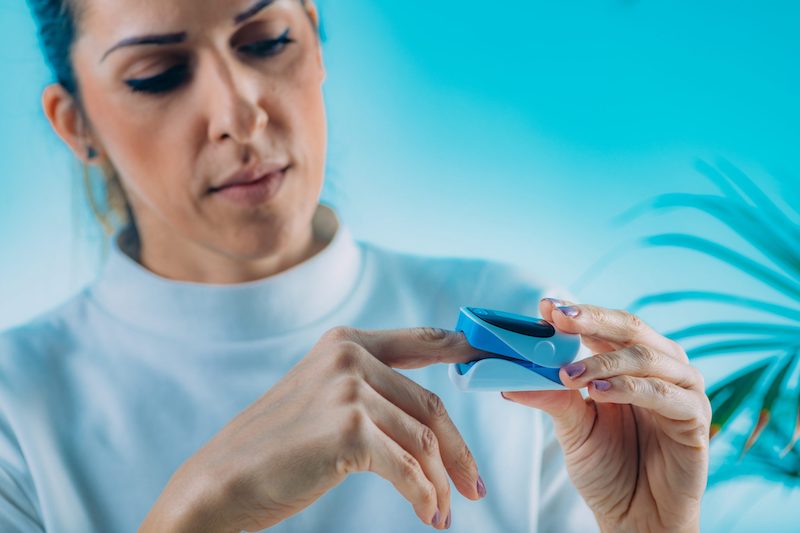What Happens to Your Lungs When You Vape?

September 19, 2019
By Marisa Tranchina
My aunt smoked cigarettes for years, then a couple of years ago she switched to e-cigarettes and I thought to myself, phew, she’s committed to better health.
How many of you can relate to that sense of relief you felt when someone you loved stopped smoking traditional cigarettes? Or how many of you were personally committed to quitting cigarette smoking by leaning on this ‘healthier’ crutch, the e-cigarette, or vaping? You’re not alone…in fact, millions of Americans have been vaping.
Some turned to vaping as a healthier alternative to smoking, but others, especially teens, are attracted to the fun flavors, like strawberry, vanilla and pink lemonade, that are marketed across the U.S.
Whatever brought you to vaping, the unfortunate truth is: ten plus years later we are starting to see that the effects of vaping are equally, if not more harmful, than smoking traditional cigarettes.
What does vaping do to your lungs?
There are some studies that show that one chemical, called diacetyl, that’s used in vape to give butter-like and other flavors, is causing disease in the small airways of the lung, thickening the air sacs and causing inflammation.
“In the medical community, we call this ‘popcorn lung’,” says Ziad Hanhan, M.D., FACS, medical director for minimally invasive thoracic surgery at Riverview Medical Center and Bayshore Medical Center. “Many years ago, workers in a popcorn factory developed serious lung illness from breathing in the diacetyl that was used to flavor microwaveable popcorn. This solvent is proving to be more harmful than tobacco and THC that people are inhaling through e-cigarettes.”
But diacetyl isn’t the only issue with vaping. “We are still learning more, but other substances that are used to make vape dissolvable, like vitamin E acetate or propylene glycol, are believed to also be highly irritating to the lung,” Dr. Hanhan adds.
It is too early to tell if vaping can lead to cancer, but Dr. Hanhan says it wouldn’t surprise him if chronic exposure had this effect. “It could take 20 years, but there is a well-known link between inflammation and cancer.”
What are the signs of vaping illness?
“If you’re vaping and experiencing shortness of breath, wheezing, headaches, fevers or body aches, you should see your doctor,” says Nabil Rizk, M.D. chief of the Division of Thoracic Surgery at Hackensack University Medical Center."
The number of vaping related deaths and illnesses are on the rise, with seven deaths nationally as of September 17, 2019 and more than 400 illnesses requiring hospitalization. “There’s no time to waste,” adds Dr. Rizk. “You have to be diligent about your health and value your lungs. They are not meant to ingest these chemicals.”
A Desperate Call Out to Young People
The statistics are alarming. According to the Centers for Disease Control and Prevention, in 2017, roughly one in ten high school children vaped. In 2018, that number jumped to one in five.
“The impact of vaping is really scary,” says Dr. Hanhan. “I’ve had two young patients in their 20s in the last six months that had a collapsed lung and required a chest tube and operation to fix. In one, in particular, I was shocked when I did the operation. Her lungs looked so black that it was striking, it looked like she smoked for 50 years. I can’t say definitively that this was caused by vaping, but I don’t think it’s a coincidence that both of these patients vape. We need to educate young people about the real danger here.”
For parents, there are several signs that your kid may be vaping. “Always keep an open dialogue with your children and communicate what you learn,” says Dr. Rizk. “Reach out to your pediatrician or primary care physician if you think there’s need for concern. You’ll be surprised about how many tools and resources are available to help people quit smoking/vaping.”
Next Steps & Resources:
- Meet our clinical contributors: Ziad Hanhan, M.D., and Nabil Rizk, M.D.
- To make an appointment with Drs. Hanhan or Rizk, or a doctor near you, call 800-822-8905 or visit our website.
Sources
The material provided through HealthU is intended to be used as general information only and should not replace the advice of your physician. Always consult your physician for individual care.






